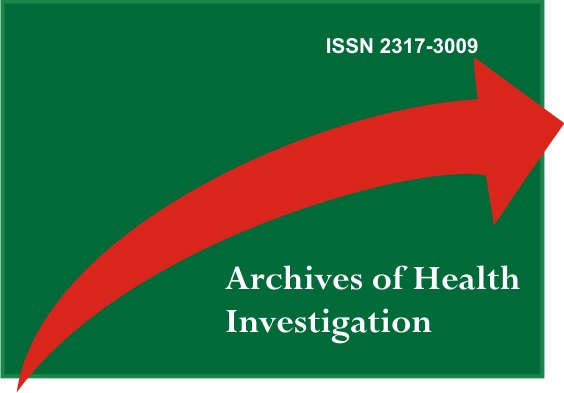Estratégia de Ensino em Suporte Básico de Vida Através da Produção de Vídeos de Simulação: Uma Experiência Didático-Pedagógica
DOI:
https://doi.org/10.21270/archi.v13i1.6289Palavras-chave:
Suporte Básico de Vida, Metodologias Ativas de Aprendizagem, Educação MédicaResumo
Objetivo: O presente trabalho relata uma experiência didático-pedagógica em que os alunos foram incentivados a produzir vídeos de simulação abordando quatro temáticas relacionadas ao Suporte Básico de Vida (SBV): suporte em adultos, em bebês e crianças, e obstrução das vias aéreas por corpo estranho (OVACE) em adultos e crianças ou bebês. Relato de Experiência: A experiência ocorreu na disciplina de Habilidades e Atitudes Médicas II na Afya Faculdade de Ciências Médicas de Bragança, Bragança-PA. Os alunos foram organizados em grupos e orientados sobre os protocolos de SBV, tanto teóricos quanto práticos. Em seguida, tiveram a tarefa de criar roteiros para os vídeos, que abordaram as temáticas propostas. Cada vídeo teve um limite de 10 minutos. Todos os alunos participaram ativamente na elaboração dos roteiros e atuaram como socorristas e pacientes, com suporte contínuo dos docentes. Ao dialogar com os alunos sobre a experiência, ficou patente o impacto positivo do trabalho em equipe e da vivência dos papéis de socorrista e paciente. Este feedback enriquecedor não apenas valida a eficácia da estratégia de ensino adotada, mas também aponta para a relevância de estratégias pedagógicas inovadoras que fomentem a participação ativa dos alunos. Considerações Finais: A implementação da produção de vídeos de simulação revelou-se uma estratégia de ensino altamente eficaz para o SBV. O alto engajamento dos alunos na elaboração e atuação nos vídeos fortaleceu a aprendizagem e consolidação dos conhecimentos adquiridos. Além disso, os vídeos produzidos agora servem como valioso material didático para futuras turmas. Esta abordagem inovadora na formação de habilidades médicas proporcionou uma aprendizagem autêntica e contextualizada, preparando os alunos de forma mais efetiva para situações reais de emergência.
Downloads
Referências
Olasveengen TM, Semeraro F, Ristagno G, Castren M, Handley A, Kuzovlev A, Monsieurs KG, Raffay V, Smyth M, Soar J, Svavarsdottir H, Perkins GD. European Resuscitation Council Guidelines 2021: Basic Life Support. Resuscitation. 2021;161:98-114. doi: 10.1016/j.resuscitation.2021.02.009.
Berg RA, Hemphill R, Abella BS, Aufderheide TP, Cave DM, Hazinski MF, Lerner EB, Rea TD, Sayre MR, Swor RA. Part 5: adult basic life support: 2010 American Heart Association Guidelines for Cardiopulmonary Resuscitation and Emergency Cardiovascular Care. Circulation. 2010;122(18 Suppl 3):S685-705. doi: 10.1161/CIRCULATIONAHA.110.970939.
Bhanji F, Donoghue AJ, Wolff MS, Flores GE, Halamek LP, Berman JM, Sinz EH, Cheng A. Part 14: Education: 2015 American Heart Association Guidelines Update for Cardiopulmonary Resuscitation and Emergency Cardiovascular Care. Circulation. 2015;132(18 Suppl 2):S561-73. doi: 10.1161/CIR.0000000000000268.
Elshama SS. How to apply simulation-based learning in medical education? Iberoam J Med. 2020;2(2):79-86. doi:https://doi.org/10.5281/zenodo.3685233
McGaghie WC, Issenberg SB, Petrusa ER, Scalese RJ. A critical review of simulation-based medical education research: 2003-2009. Med Educ. 2010;44(1):50-63. doi: 10.1111/j.1365-2923.2009.03547.x.
Elshama SS. How to develop Medical Education: Implementation view: Scholars' Press; 2015.
Khan JUA, Jamil B, Ahmed F, Khan UA, Qaiser A. Role play as a learning and teaching modality and its effectiveness in improving the communication and critical thinking skills of medical students. J Med Sci. 2020;28(2):155-7.
So HY, Chen PP, Wong GKC, Chan TTN. Simulation in medical education. J R Coll Physicians Edinb. 2019;49(1):52-57. doi: 10.4997/JRCPE.2019.112.
Rojas MA, Villafuerte J. The influence of implementing role-play as an educational technique on EFL speaking development. Theory and Practice in Language Studies. 2018;8(7):726-32. doi: http://dx.doi.org/10.17507/tpls.0807.02
Gonzalo JD, Dekhtyar M, Starr SR, Borkan J, Brunett P, Fancher T, Green J, Grethlein SJ, Lai C, Lawson L, Monrad S, O'Sullivan P, Schwartz MD, Skochelak S. Health Systems Science Curricula in Undergraduate Medical Education: Identifying and Defining a Potential Curricular Framework. Acad Med. 2017;92(1):123-131. doi: 10.1097/ACM.0000000000001177.
Arnold L, Cuddy PG, Hathaway SB, Quaintance JL, Kanter SL. Medical School Factors That Prepare Students to Become Leaders in Medicine. Acad Med. 2018;93(2):274-282. doi: 10.1097/ACM.0000000000001937.
Smithson S, Beck Dallaghan G, Crowner J, Derry LT, Vijayakumar AA, Storrie M, Daaleman TP. Peak Performance: A Communications-Based Leadership and Teamwork Simulation for Fourth-Year Medical Students. J Med Educ Curric Dev. 2020;7:2382120520929990. doi: 10.1177/2382120520929990.
Camarata T, Slieman TA. Improving Student Feedback Quality: A Simple Model Using Peer Review and Feedback Rubrics. J Med Educ Curric Dev. 2020 Sep 25;7:2382120520936604. doi: 10.1177/2382120520936604.
Engerer C, Berberat PO, Dinkel A, Rudolph B, Sattel H, Wuensch A. Specific feedback makes medical students better communicators. BMC Med Educ. 2019;19(1):51. doi: 10.1186/s12909-019-1470-9.
Stevens R. Role-play and student engagement: reflections from the classroom. Teach High Educ. 2015;20(5):481-92. doi: 10.1080/13562517.2015.
da Silva ARP, de Andrade AKP, dos Santos NO. Formação docente e protagonismo estudantil de acadêmicos de Medicina: desafios e perspectivas. Educação Por Escrito PUCRS. 2018;9(2):188-203.


